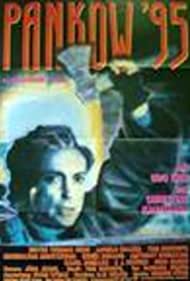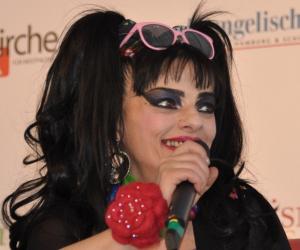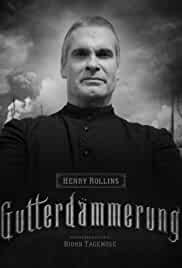


Nina Hagen made her acting debut in 1974 with an appearance in an episode of the East German television series ‘ABC der Liebe’, starring her mother, actress and singer Eva-Maria Hagen. The following year, she continued to appear on television in the East German telefilms ‘Heiraten weiblich’ and ‘Heute ist Freitag’. She again shared screen space with her mother in her big screen debut in the 1976 East German movie ‘Liebesfallen’, in which she also performed in songs. However, the film’s theatrical run was cut short following her step-father Wolf Biermann's expatriation from the GDR in 1976, which forced her and her mother to migrate to West Germany. That year, she had also played a supporting role in another East German film, ‘Unser stiller Mann’.
Nina Hagen, who had settled in Hamburg, was invited to London, United Kingdom by independent filmmaker and photographer Juliana Grigorova to appear in her short film ‘The Go-Blue Girl’ in 1978. The same year, she appeared alongside Grigorova in the German-language British short film ‘Peach Melba’. She made her first appearance in a West German movie in the 1979 drama film ‘Ticket of No Return’ (‘Bildnis einer Trinkerin’) in a bit role of a singer in a pub. Also in 1979, she had a starring role in the Dutch musical comedy film ‘Cha Cha’. The film, which featured musical performances by the main actors and had lead characters with the same name as the actors portraying them, went on to become a cult hit. Her next film role was as Jungfrau Maria in the 1983 West German sci-fi movie ‘Pankow '95’. In 1988, she appeared in the free-form documentary ‘Dandy’, loosely based on the French satire ‘Candide’ by Voltaire.
In 1996, Nina Hagen played the role of Suzanne in the German family drama film ‘Lilien in der Bank’. The following year, she had a brief appearance as herself on the episode ‘Tod im All’ of the German police procedural series ‘Tatort’ in which she performed her 1982 song ‘UFO’ and claimed having an encounter of the third kind in the 1980s. In 1999, she was the first presenter of the British horror series ‘Sci-Fright’, in which the hostess character was named ‘Nina’ after her, even though the series was hosted by other presenters in later years. She was one of the main casts of the German-Russian fantasy adventure film ‘Vasilisa’ (2000). In 2004, she portrayed the role of Böse Königin, the evil queen, in the German fantasy film ‘7 Dwarves – Men Alone in the Wood’ (‘7 Zwerge – Männer allein im Wald’), based on the story of ‘Snow White and the Seven Dwarves’ by the Brothers Grimm. The film also featured her daughter Cosma Shiva Hagen as Snow White. It was followed by the 2006 sequel ‘7 Dwarves: The Forest Is Not Enough’ (‘7 Zwerge - Der Wald ist nicht genug’), in which she reprised her role as Hexe, the witch and the former queen. In the meantime, she appeared in the episode ‘Catwalk’ of the German action comedy series ‘Wilde Engel’ (‘3 Wild Angels’, 2005). Following a long gap, she appeared as Oracle in the 2015 German comedy drama film ‘Desire Will Set You Free’. Her last film appearance was in a small but important role in the 2016 rock music film ‘Gutterdämmerung’, which was promoted for being “the loudest silent movie ever”. Furthermore, she has acted in the music videos of several of her songs throughout her career.
During the 1990s, Nina Hagen did voice-acting for characters in the German dubbed versions of several American films, such as Julie in ‘Look Who's Talking Too’ (1990), Sally in ‘The Nightmare Before Christmas’ (1993), Mama Toad in ‘Thumbelina’ (1994), and Stormella in ‘Rudolph the Red-Nosed Reindeer’ (1998). She lent her voice to the character Emmo in the 1999 German animated adventure comedy film ‘Hot Dogs: Wau - wir sind reich!’ (also known as ‘Millionaire Dogs’). In 2003, she voiced the German dubbed versions of the Japanese animated fantasy film ‘Spirited Away’ (‘Chihiros Reise ins Zauberland’) and the French animated film ‘La Prophétie des grenouilles’ (‘Das Geheimnis der Frösche’). The next year, she provided the Voice of the House in the German-language Austrian-Swiss family film ‘Villa Henriette’. After a decade, she returned to voice Eisfee Dellamorta in the animated comedy film ‘The Seventh Dwarf’ (‘Der 7bte Zwerg’, 2014), which was a sequel to the previous live-action ‘7 Dwarves’ films. Also in 2014, she provided the German voice for Gunilla in the German-Australian animated comedy adventure film ‘Maya the Bee Movie’, in which she worked alongside both her mother and her daughter.















